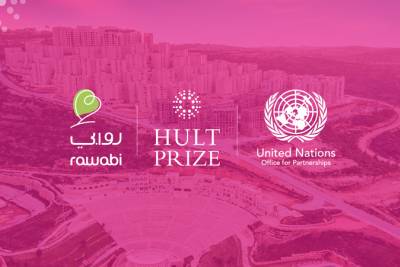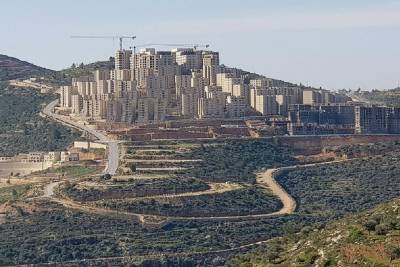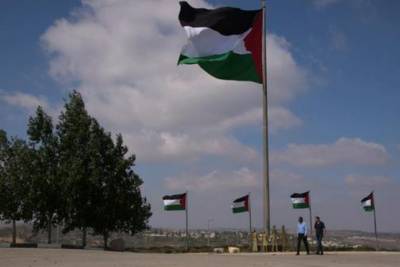A $ 450M shopping center in Rawabi to attract young high-tech experts
The Times of Israel - Dov Liber - 'RAWABI PROGRESSES EVEN THOUGH THE PA HAS NOT FUNDED ANYTHING IN THE PROJECT AND THE ISRAELI GOVERNMENT, SAYS ITS FOUNDER, PLACES OBSTACLES INSTEAD OF PROVIDING HELP'
Businessman Bashar Masri believes Armani and Calvin Klein's appeal can help turn Rawabi into a 'Silicon Valley' in the West Bank

THE COMMERCIAL AND BUSINESS PLACE OF RAWABI KNOWN AS Q-CENTER (AUTHORIZATION)
RAWABI, West Bank - In order for the Palestinian city of the future to fulfill its destiny, it must attract good people, and it now has a vital component to do so - a shopping and shopping center that has cost $ 450 million and is home to boutiques of the world's leading brands.
The huge 'Q-center' - named because of its shape (and perhaps because of its Qatari supporters) - is the new place where Palestinians can find Armani suits, Calvin Klein jeans, Lacoste shirts and more. Michael Kors handbags.
Rawabi, a city on the hills of north-eastern Ramallah, is a massive $ 1.4 billion project that aims to build a modern, elegant city to demonstrate that Palestinians have the right things to build a state - and build it well.
The city's founder, Palestinian businessman Bashar Masri , admits that so far the investment is at a loss. But he and his wealthy trading partner - the Qatari government - are committed to seeing the project succeed.
When the city is finished, Rawabi will look more like a city-state than a simple municipality: Rawabi has its own water treatment plant, its own schools and soon its own hospital - all are private institutions.
From the tall, gleaming towers to the fiber-optic cable for high-speed Internet, to the largest amphitheater in the Middle East (about 155 square meters), everything in Rawabi is of the highest quality . The Palestinian Authority has not disbursed what some have called a "flagship city" of a potential Palestinian state.
The motto of the city is "live, work, grow". The idea is that Rawabi can be a universal experience rather than a dormitory city. The last element that is brought here today is essential for the city to be truly independent, because it must offer quality jobs and attract qualified residents.
Yuppies desired
The first phase of Masri's job creation strategy is to transform Rawabi into a "technology cluster". And to do this, he needs to attract hi-tech workers and entrepreneurs. "What are the things that people who work in technologies would like to see, the young Westernized Yuppies who are earning a good income? They love fashion, good food and movies, "explains Masri.

The commercial and business place of Rawabi known as Q Center.
If he can attract the necessary talent and create the right atmosphere, Masri hopes that Rawabi can become a Palestinian "Silicon Valley" that will generate jobs on the site and attract foreign investors.
The software developer Asal Technologies already employs nearly 200 employees in Q center's commercial offices while the Israeli technology firm has hired 100 people on the site.
"Is this a success? Masri asks from a rhetorical point of view. " It's a beginning ".
Rawabi, according to Masri, is already the largest private employer of the Palestinian Authority, having created between 8,000 and 10,000 jobs, both "direct and indirect".
The Palestinian businessman also wants to "capitalize on proximity to Israel."
He predicts that international and Israeli technology companies are outsourcing intermediate jobs to Rawabi rather than to distant countries like India or Ukraine.
And while travel from Israel to the West Bank is not easy, in the high-tech industry - where much of the trade is online - Masri says borders are becoming less problematic.
Struck by reality
But all the complexities and hindrances of the Israeli-Palestinian conflict can not be so easily avoided.
The second phase, which concerns a logistics and light industry area on the outskirts of the city, is already underway but has encountered Israeli military bureaucracy.
Construction on the site has been frozen by the Israeli army - which controls access to the West Bank - because the project's entry passes through the Israeli-controlled West Bank Zone C.
And even though the current government, led by Prime Minister Benjamin Netanyahu, has often praised the idea of economic peace - by which Israel would help the Palestinian economy prosper and, in return, the Jewish state could see a Political stability among Palestinians - Masri said that in reality he is encountering obstacles rather than receiving help.
When he talks to Israeli politicians, they say "adore" Rawabi's project, says Masri. "But these are just political words."
"To take action," he adds, the tone of his voice marked by anger, "they always do too little, they act too late."

Bashar Masri is the man who developed Rawabi, the first planned Palestinian city.
The inhabitants of Rawabi were able to take possession of their new homes in 2014, but it took Israel, which controls water in Palestinian cities, more than two years to agree to connect the new city to the network.
In addition to costing Masri millions of dollars for the delay, the businessman still blames this episode of water for "destroying the euphoria" around Rawabi.
Even today, this amazing and open city looks somewhat like a ghost town. Crossing Rawabi driving a car, you have to look carefully for signs of life. It can be a flower pot on an isolated balcony, or some bikes placed in front of a door.
Only 2,500 to 3,000 people live there. When construction is completed, in five to seven years, Rawabi should have 8,000 apartments in 23 different neighborhoods.
The new mall can also be misleading. While the wide variety of stores and designer brands gives the impression of an outside investment, the truth is that all shops - except a coffee -
belong to the municipality of Rawabi itself. There is also a dry cleaner and a supermarket in the residential area that are private companies, but the owners of these establishments will not pay rent for another three years.
Masri says Rawabi's perception of instability in the eyes of outside investors scares them. "There is a feeling among the Palestinians that Rawabi is an isolated city," he adds.
It evokes the only "tiny" road that leads to the city. Because Rawabi's entry is in Zone C, Masri has not yet obtained permission from Israel to build a normal entrance.
There is also an Israeli military checkpoint located between Rawabi and Ramallah. Masri says the checkpoint deters those who would like to spend a stress-free shopping day in the city.
Rawabi has also been accused by some Palestinians of "collaborating" with Israel, some of its suppliers being Israeli companies and also because Masri is coordinating with the Israeli authorities.
Masri is categorical when he says he does not negotiate with Israel as a private businessman, but only through his post at a commission appointed by the PA needed to communicate with the Jewish state about the project.

Basim Dodin, on the right, and his wife Asma were among the first Palestinian inhabitants of Rawabi.
There is also the feeling among the Palestinians that Rawabi does not go to favored families, a feeling reinforced by the fact that Masri said that in order to encourage customers to come to Rawabi, he will not allow any brand of to install at the Q-Center if it already exists anywhere in the territories of the Palestinian Authority.
However, according to Ibrahaim Natour, Rawabi's contract manager, the city's apartments are, on average, cheaper than those in Ramallah, the neighboring city. A flat of 94 square meters is proposed at the price of 65 000-70 000 dollars. A five-room apartment costs $ 160,000.
A free day
But even as the shopping center waits for the city to grow, Masri hopes he will attract Palestinians from the rest of the West Bank.
The products in this shopping center will not be offered at a discount price simply because the Palestinian economy is underdeveloped. Any Palestinian wanting to afford Tommy Hilfiger pants worth 600 shekels ($ 170), or even - more expensive - a shirt of the Italian fashion brand Paul and Shark, can now acquire it without having to go too far.
Natour, the contract manager, recognizes that the new shopping center can be beyond the purchasing power of many Palestinians and is only for the privileged and privileged classes.
But, he notes, Palestinians from across the socio-economic spectrum travel to Jordan or to the mall of Malha of Jerusalem when they are looking for something special for a rare occasion or a gift. They can now find these products in their own backyard.
The first store
While buyers, locals and even employees are still scarce, there are some signs of hope.
Murad Howari was the first Palestinian entrepreneur to open a shop in the Q-Center. He owns Shishapresso, a high-end cafe where you can enjoy cappuccinos and shisha - also known as hookah - for 3 euros.

Murad Howari, founder of the Shishapress coffee chain, is the first Palestinian entrepreneur to own a shop in Rawabi's Q-Center.
Howari opened its first coffee shop in Ramallah two years ago, a successful establishment. He has now expanded his business to Nablus in the northern West Bank and Egypt, making his cafes, he says, the first Palestinian franchise outside the Palestinian territories.
And if an agreement to open a café in the Arab-Israeli city of Kafr Qassem comes to an end, it could soon become one of the few Palestinian businessmen employing Israelis.
Why did he choose to invest in the city? He answers, "Because I believe in Rawabi. I think the future here will be very good. "
To view original article in French, Click Here.
To view original translated article, Click Here.



